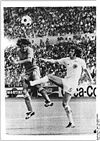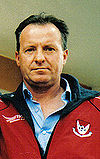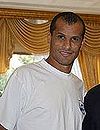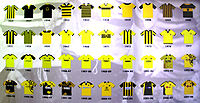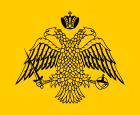- AEK Athens F.C.
-
Further information: Athletic Union of Constantinople
AEK Athens F.C. 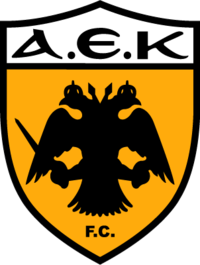
AEK Athens F.C. logoFull name PAE Athlitiki Enosis Konstantinoupoleos
(English: Athletic Union of Constantinople F.C.)Nickname(s) Enosis (English: Union)
Dikefalos Aetos (English: Double-Headed Eagle)
Kitrinomavroi (English: Yellow-Blacks)Founded 13 April 1924 Ground Olympic Stadium
Athens, Greece
(Capacity: 69,618[1])Μajor shareholder  Nicholas X. Notias
Nicholas X. NotiasChairman Vacant Head Coach  Nikos Kostenoglou
Nikos KostenoglouLeague Super League Greece 2010–11 4th[2][3][4] Website Club home page Home coloursAway coloursThird colours Current season
Current seasonActive departments of
AEK Athens


Football Basketball Volleyball 


Handball Futsal Fencing 


Chess Cycling Boxing 


Athletics Table tennis Club AEK Athens F.C. (Greek: Π.Α.Ε. AEK – Αθλητική Ένωσις Κωνσταντινουπόλεως – Athlitiki Enosis Konstantinoupoleos), the Athletic Union of Constantinople, is a Greek association football club based in the city of Athens, Greece. Outside Greece, the club is also known as AEK Athens, however, the word Athens is not part of the club's official title.
Established in Athens in 1924 by Greek refugees from Constantinople in the wake of the Greco-Turkish War, AEK has grown to become a fairly successful club in Greek football, winning 30 national titles (including 11 Championships, 14 Greek Cups, 2 League Cup and 3 Super Cups).The team regularly appears in European (UEFA Champions League and UEFA Europa League) competitions. AEK is a member of the European Club Association.[5] The club competes in the Super League Greece.[6]
Contents
History
Main article: History of AEK Athens F.C.Early history
The large Greek population of Constantinople, not unlike those of the other Ottoman urban centres, continued its athletic traditions in the form of numerous athletic clubs. Clubs such as Enosis Tataoulon (Ένωσις Ταταούλων) from the Tatavla district, Megas Alexandros (Μέγας Αλέξανδρος) of Vathyriakos, Hermes (Ερμής – Ermis) of Galata, Olympias (Ολυμπιάς) of Therapia, and Kati Kioi (Κατί Κίοϊ) of Chalcedon existed to promote Hellenic athletic and cultural ideals. These were amongst a dozen Greek-backed clubs that dominated the sporting landscape of the city in the years preceding World War I. After the war, with the influx of mainly French and English soldiers to Constantinople, many of the city clubs participated in regular competition with teams formed by the foreign troops. Taxim, Pera and Tatavla became the scene of weekly competitions in not only football, but of athletics, cycling, boxing and tennis.
Of the clubs in the city, though, football was dominated by Enosis Tataoulon and Hermes. Hermes, one of the more popular clubs, was formed in 1875 by the Greek community of Pera (Galata). Forced to change its name to Pera Club in 1921, many of its athletes, and those of most other sporting clubs, fled during the population exchanges at the end of the Greco-Turkish War, and settled in Athens and Thessaloniki.[7]
1924–1939
In 1924, a group of Constantinopolitan refugees (among them athletes from Pera Club and the other Constantinopolitan clubs) met at the athletic shop of Emilios and Menelaos Ionas on Veranzerou Street, in the center of Athens, and established AEK.[8]
The founders of AEK established the club with the intention of providing athletic and cultural diversions for the thousands of predominantly Constantinopolitan and Anatolian refugees who had settled in the new suburbs of Athens (predominantly Nea Filadelfeia, Nea Ionia, Nea Chalkidona, Nea Smyrni).
A.E.K. F.C. first football team
GK:N.Kitsos, DF:Ieremiadis, DF:T.Asderis, MF:Kehayas, MF:Paraskevas, MF:Dimopoulos, MF:Karagiannidis, FW:Baltas, FW:Milas, FW:Iliadis, FW:Georgiadis.The first match was against Aias Athinon in November 1924 and A.E.K. won it with 2–0.
AEK’s football team grew rapidly in popularity during the 1920s, eclipsing the already-established Athens-based refugee clubs (Panionios, Apollon Smyrnis), thanks mainly to the large pool of immigrants that were drawn to the club and due, in no small part, to the political connections and wealth of several of the club’s board members. Not possessing a football ground, AEK played most of its early matches at various locations around Athens, including the grounds of the Temple of Olympian Zeus and the Leoforos Alexandras Stadium.
AEK’s first president, Konstantinos Spanoudis (1871–1941), a journalist and associate of the then Greek Prime Minister Eleftherios Venizelos, petitioned the government to set aside land for the establishment of a sports ground. In 1926, land in Nea Filadelfia that was originally set aside for refugee housing was donated as a training ground for the refugees. AEK began using the ground for training (albeit unofficially) and by 1930 the property was signed over to the club. Venizelos soon approved the plans to build what was to become AEK’s home ground for the next 70 years, the Nikos Goumas Stadium. The first home game, in November 1930, was an exhibition match against Olympiacos that ended in a 2–2 draw.[9]
In 1928 Panathinaikos FC, Olympiacos, and AEK began a dispute with the fledgling Hellenic Football Federation (EPO), decided to break away from the Athens regional league and form an alliance called P.O.K.(acronym for Podosfairikes-Omades-Kentrou). During the dispute, POK organised friendly matches against each other and several continental European clubs. In 1929, though, the dispute ended and AEK, along with the other POK clubs, entered the EPO fold once again.
In 1932, AEK won their first Greek Cup title, beating Aris Thessaloniki F.C. 5–3 in the final. The team boasted a number of star football players in Kostas Negrepontis (a veteran of the original Pera Club of Constantinople), Kleanthis Maropoulos, Tryfon Tzanetis, Michalis Delavinias, Giorgos Mageiras and Spyros Sklavounos.
The club’s mixed success during the 1930s was highlighted by the first Greek Championship-Cup double in 1939.
1940–1959
Under former player Kostas Negrepontis as coach, AEK won the Greek Championship in 1940. With English coach Jack Bimby at the reins, veteran players Maropoulos, Tzanetis, Delavinias and Mageiras, along with new blood Kostas Poulis, Giorgos Goulios, and Pavlos Emmanoualidis, AEK won the Greek Cup competitions of 1949 and 1950, beating Panathinaikos 2–1 and Aris 4–0.
AEK won also the Athens regional championship of 1950, but the playoff games for the Pan-Hellenic title were not played, due to many players being called up for a prolonged training camp for the national team.
The early 1950s saw the addition of the next generation of star footballers in Giannis Kanakis, Andreas Stamatiadis, and goalkeeper Stelios Serafeidis, and along with Poulis and Emmanoualidis, AEK again won the Greek Cup title of 1956, this time beating Olympiacos 2–1 in the final. 1957 saw the debut of one of the greatest forwards of the era, Kostas Nestoridis. Having joined AEK from Panionios in 1956, Nestoridis was forced to sit out the 1956 season because of a dispute between the two clubs over his transfer. In 1958 and 1959 he finished top goal scorer in the league, but it wasn’t enough for AEK to take any titles.
1960–1979
With Kostas Nestoridis scoring goals aplenty in the early 1960s, (top goalscorer 1958–1963), and the timely signing of attacker Dimitris Papaioannou in 1962, AEK went on to win the 1963 Championship.
Known affectionately as “Mimis” by the AEK supporters, Papaioannou scored twice in the 1963 playoff against Panathinaikos, levelling the scores at 3–3 and giving AEK its first post-war championship title on goal aggregate. Coached by Hungarian-German Jenő Csaknady, the championship team also consisted of veterans Nestoridis, Serafeidis and Stamatiadis, Alekos Sofianidis, Stelios Skevofilakas, Giorgos Petridis, Manolis Kanellopoulos, and Miltos Papapostolou.
The club followed up with Cup victories in 1964 and 1966 on papers, and with the return of Csaknady to the coach’s position in 1968, and with some great players in Kostas Nikolaidis, Giorgos Karafeskos, Panagiotis Ventouris, Fotis Balopoulos, Spyros Pomonis, Alekos Iordanou, Nikos Stathopoulos and Andreas Papaemmanouil, AEK won the championship with relative ease, and became the first Greek football club to reach the quarter-final of European Champions Cup. The addition of goalkeeper Stelios Konstantinidis and Apostolos Toskas reinforced the team and allowed AEK to take its fifth championship title in 1971. AEK won also the unofficial Super-Cup of 1971 beating Olympiacos 4–2 on penalty kicks, after 2 draws of 2–2 at Piraeus and 1–1 at Nea Filadelfia (normal time). Loukas Barlos took over the presidency of AEK in 1974, and with the help of Czech-Dutch coach Frantisek Fadrhonc built one of the finest teams in the club’s history. The Barlos “Golden Era” saw some of the greatest players ever to have played for AEK. Christos Ardizoglou, Giorgos Dedes, Giorgos Skrekis, the Germans Walter Wagner and Timo Zahnleiter, Dionysis Tsamis, Pantelis Nikolaou, Petros Ravousis, Serbian Dušan Bajević, Takis Nikoloudis, Stefanos Theodoridis, Christos Itzoglou, Nikos Christidis. Captained by Papaioannou, 1976–1977 saw AEK reach the semi-finals of the UEFA Cup competition, the first Greek football club to do so. Beating FC Dynamo Moscow (Russia) 2–0, Derby County F.C. (U.K.) 2–0 and 3–2, Red Star Belgrade (Yugoslavia) 2–0, and QPR (U.K.) 3–0 and 7–6 on penalties, AEK were eventually eliminated by Gianni Agnelli’s Juventus FC. Juventus went on to win their first European title.
It was during this period that AEK signed one of Greece’s finest strikers, Thomas Mavros. He was an integral part of the team that reached the UEFA Cup semi finals in 1976, but it was his devastating form (top goal scorer of 1978 and 1979 – 22 and 31 goals, respectively) that helped AEK take the 1978 Championship-Cup double. The addition of former Panathinaikos FC stars Dimitris Domazos and Kostas Eleutherakis to the AEK roster the following year saw the club cap off their most successful decade to-date by winning the 1979 Championship.
Under Loukas Barlos, the Nikos Goumas Stadium was finally completed with the addition of the iconic “Covered Stand”, or Skepasti (Σκεπαστή), which eventually became home to the most fanatic of AEK supporter groups, Original 21. The next generation of star players, fresh out of the AEK Academy, made their debut during this period – Stelios Manolas, Spyros Ekonomopoulos, Vangelis Vlachos and Lysandros Georgamlis.
1980–1999
With new president Michalis Arkadis and Austrian head coach Helmut Senekowitsch, AEK won the 1983 Greek Cup, beating PAOK FC 2–0 in the newly built Athens Olympic Stadium. Thomas Mavros and 21-year-old captain Vangelis Vlachos were the goalscorers.
AEK also chased the elusive Championship title and it finally came in 1989. Coached by former player Dušan Bajević, AEK clinched the title after a winning a crucial match 1–0 against Olympiacos at the Athens Olympic Stadium. Takis Karagiozopoulos scored the goal that gave AEK its first Championship in a decade. AEK won also the Greek Super-Cup of 1989, beating Panathinaikos on penalties, (normal time 1–1).
After the 1989 triumphs, under Bajević, AEK built what was to become one of the most successful teams in its history. Led by Stelios Manolas, the team, which included Toni Savevski, Daniel Batista, Vaios Karagiannis, Vasilis Dimitriadis, Giorgos Savvidis, Alekos Alexandris and Refik Šabanadžović dominated the Greek league through the 1990s with three successive Championship titles (1992, 1993, 1994). AEK also won the Greek League Cup of 1990 (beating Olympiakos 3–2).
In 1994–1995 AEK was the first Greek football club that participated in the group stage of the UEFA Champions League after defeating Scottish champions Rangers FC; AEK was eliminated by Ajax Amsterdam and AC Milan, who made it to the final. With Michalis Trochanas as president and Dušan Bajević as coach, the club won the 1996 Greek Cup.
Former player Petros Ravousis took over the coaching position when Dušan Bajević defected to Pireaus-based rivals Olympiacos at the end of 1996, and led the team to its second Super-Cup (August 1996), beating Panathinaikos on penalties, and to its eleventh Cup title in 1997, again beating Panathinaikos on penalties. By far AEK’s most successful run with titles, the period also saw AEK sign talented players in Demis Nikolaidis, Christos Kostis, Vassilis Tsiartas, Christos Maladenis, Andreas Zikos and Michalis Kasapis. Demis Nikolaidis, in particular, an AEK fan since childhood, declined more lucrative offers from Olympiacos and Panathinaikos FC to sign for his beloved club. During seasons 1996–1997 and 1997–1998, AEK progressed to the Quarter-Final of the European Cup Winners' Cup.
In 1999, ex-president Dimitris Melissanidis organised a friendly match against FK Partizan, in Belgrade, during the height of the NATO bombing of Serbia. As a gesture of compassion and solidarity towards the embattled Serbs, the AEK players and management staff defied the international embargo and traveled to Belgrade for the match. The game ended 1–1, when after 60 minutes of play thousands of Serbian football fans invaded the pitch to embrace the footballers.
21st century
AEK won its twelfth Cup title in 2000 under Coach Giannis Pathiakakis, defeating Ionikos 3–0 in the final. The club continued its consistency in the Championship of 2001–02 finishing second by goal aggregate to Olympiacos, and beating Olympiakos in the Greek Cup final.
Dusan Bajevic returned as coach in the summer of 2002, a move that sparked open hostility towards Bajevic from a section of AEK supporters.[citation needed] Under Bajevic, AEK progressed through the qualifying rounds in the 2002 UEFA Champions League by eliminating APOEL FC. Drawn in Group A with AS Roma, Real Madrid, and Racing Genk, AEK drew all their games and were knocked out of the competition. Off the field, AEK's home stadium for over 70 years, Nikos Goumas Stadium, was demolished and club president Chrysostomos Psomiadis, with the assistance of his bodyguards, allegedly assaulted team captain Demis Nikolaidis.[citation needed] After the altercation, and partly due to the club’s growing financial problems from mismanagement, Nikolaidis was let on free transfer by mutual consent to Atlético Madrid.[citation needed] Unable to cope with the negativity from a large section of AEK fans,[citation needed] Bajević resigned in 2004 during a match against Iraklis.
By now, on the brink of bankruptcy, and losing most of its Euro 2004 stars and experienced players to other European clubs, AEK needed a miracle to prevent it from being relegated to the Greek amateur leagues. Though both Kostas Katsouranis and Nikos Lymperopoulos remained, Vassilis Borbokis, Grigorios Georgatos, Theodoros Zagorakis, Michalis Kapsis, Michalis Kasapis, Michel Kreek, Vassilis Lakis, Vassilis Tsiartas, and Ioannis Okkas all left the club in the wake of the troubles.
In 2003 Demis Nikolaidis and other significant AEK followers formed a supporters' club Enosis 1924 (Union 1924) in order to motivate all AEK supporters into taking up the club's shares and governance. The project was not fully realised because, in the meantime, businessmen decided to buy shares and invest money to the club. However, until today, Enosis 1924's chairman is member of the AEK F.C. board.
In 2004, on the back of strong AEK fan support, Demis Nikolaidis, at the head of a consortium of businessmen, bought out the beleaguered club and became the new president. His primary task was to lead AEK out of its precarious financial position. The first success was an arrangement through the Greek justice system to write off most of the massive debt that previous club administrators had amassed, and to repay any remaining public debts in manageable installments.
Securing the club’s existence in the Alpha Ethniki, Nikolaidis then began a program to rebuild AEK to its former glory. He appointed experienced former player Ilija Ivić as technical director of the club and brought back Fernando Santos as coach. The AEK fans, emboldened by Nikolaidis’s efforts, followed suit by buying season ticket packages in record numbers (over 17,000).
AEK recruited promising young players to strengthen a depleted team. Led by the experienced Katsouranis and Lymperopoulos, and featuring Brazilian Júlio César, the club made it to the Greek Cup final for seventh time in 13 years but lost to Olympiacos with 3–0, finished second in the Championship, and in the process, secured a place in the Third Qualifying Round of the UEFA Champions League. For the 2006–07 season, former Real Betis coach Llorenç Serra Ferrer was appointed to the coaching position after Fernando Santos's contract was not renewed.
By beating Hearts over both legs (2–1 in Scotland and 3–0 in Greece), AEK progressed to the group stage of Champions-League, the club obtained a total of 8 points, having beaten AC Milan 1–0, Lille 1–0, and managing two draws with Anderlecht (1–1 in Greece and 2–2 in Belgium). AEK finished second in the Greek Super League, qualifying again for the 3rd round in the UEFA Champions League.
For the 2007/08 season AEK changed kit sponsors from adidas to Puma,[10] they have played with Sevilla FC in the UEFA Champions League third qualifying round,the 1st leg has been played on August 15, away at the Ramón Sánchez Pizjuán when AEK was defeated by 2 goals[11] and the 2nd leg played on September 3 at the Athens Olympic Stadium where AEK lost again by 1–4.[12]
In 2008, AEK completed the signings of Brazilian legend Rivaldo after he was left free from Olympiacos, Rodolfo Arruabarrena, Charis Pappas and Argentine striker Ismael Blanco. Traianos Dellas was rewarded with a new contract, keeping him at the club until summer 2009.[13] On 25 August the Super League and EPO decided to postpone the opening season's games due to the fire disaster in the Peloponnese.,[14][15]
After being eliminated from the UEFA Champions League, AEK were drawn to play FC Salzburg in the UEFA Cup. On September 20 in Athens, AEK defeated FC Salzburg 3–0.[16] The second leg was played in Salzburg on October 4 AEK lost the match but still went through 3–1 on agg.[17] On October 9 AEK were drawn in Group C in the UEFA Cup group stage along with Villarreal, Fiorentina, Mladá Boleslav, and Elfsborg.[18] On October 25 AEK kicked off the group stage's with a 1–1 draw away to Elfsborg,[19] on November 29 AEK again drew 1–1,this time at home to Fiorentina.[20] On December 5 AEK won Mlada Boleslav 1–0[21] away and on December 20 although AEK was home defeated 1–2[22] by Villarreal CF, finally booked a place in the knockout stage of the UEFA Cup, finishing third in the group. They were then drawn against Getafe CF in the third round (phase of 32). AEK has been advanced to the third round of UEFA Cup, for second consecutive season.
On 12 February AEK parted company with Llorenç after a poor run of form and un-successful signings[23] and replaced him with former player Nikos Kostenoglou, on a caretaker basis, at the end of an indifferent season. The team initially finished in first place in the league, but after the court case between Apollon Kalamaria and Olympiacos for the illegal usage of a player in the 1–0 Apollon Kalamaria win earlier in the season, Olympiacos were awarded the 3 points in a court hearing, thus finishing 2 points ahead of AEK.[24] AEK president Demis Nikolaidis and several other managers and chairmen have been angered with the court's decision, stating that the Hellenic Football Federation knew about the usage of the illegal player prior to the game but didn't do anything about it. Giorgos Donis was appointed head coach of AEK on May 14.[25]
His reign at the club did not go well. It all began when AEK failed to surpass AC Omonia in the UEFA Cup second qualifying round, meaning there elimination from European competitions for the season.[26] Key player Rivaldo asked to leave the club to sign for Bunyodkor on August 27.[27]
The league campaign started very well after a win over rivals Panathinaikos in the opening game of the season, but poor performances and results from then on left AEK in a difficult situation. Head coach Giorgos Donis was eager to leave the club, but president Demis Nikolaidis did not allow him to leave. Nevertheless, Nikolaidis left due to these disappointing results and after a controversy with the clubs supporters Original 21,[28] leaving temporarily the presidency to member of the D.C., Nikos Koulis and Takis Kanellopoulos.[29]
However, the series of disappointing results continued, bringing anger and insecure situations for everyone in the team. The first to be hit by this wave of disappointment and with the council of the team upset, was the coach Giorgos Donis, who was asked to leave the team.[30] On November 21, 2008, AEK hired Dušan Bajević as head coach for the third time.[31] However, after a while, Takis Kanellopoulos left the team, as he sparked a rivalry with Bajević.
On 4 February 2009, Nikos Thanopoulos was elected as the 41st president of AEK FC.[32] Bajevic brought some much-needed stability to the club, and performances on the pitch improved vastly towards the end of the season, culminating in AEK's progression to the Greek Cup final against Olympiacos which was played on 2 May 2009 at Athens Olympic Stadium.[33] AEK lost in the final 14–15 on penalties.[34] AEK finished the regular season at 4th position, thus qualifying for the season's playoff's, in which they eventually finished second, just missing out on UEFA Champions League qualification.
In the summer transfer period of 2010, AEK, despite being low on budget, manage to reinforce it's ranks with many notable players. Club idols Nikos Liberopoulos and Traianos Dellas signed the last 1-year contract of their careers, and many new and experienced players signed to AEK, the most notable of whom were Papa Bouba Diop, Cristian Nasuti and Christos Patsatzoglou amongst others. AEK qualified for the 2010–2011 Europa League group stage after defeating Dundee United 2–1 on aggregate.
On 7 October 2010, Manolo Jiménez took over from Dušan Bajević at AEK Athens after he stepped down as AEK manager, agreeing to a two-year deal.[35]On 30th April 2011, AEK won the Greek Cup for 14th time, by defeating 3–0 Atromitos FC at the final.
To compensate the departures of Nacho Scocco, Papa Bouba Diop, Sebastian Saja and Ismael Blanco in the summer of 2011 A.E.K. signed amongst others the captain of Iceland's Eiður Guðjohnsen and the Colombian international Fabián Vargas.
Colours and Kit
AEK's first home colours, used from 1924 until c.1927. The colours of yellow and black were adopted from AEK's connections with Constantinople and the Byzantine Empire.[36]
AEK have always worn predominantly yellow shirts (striped or plain), black shorts, and yellow or black socks. The only exception has been in the unusual, but notable, Kappa kits of the 1990s (which featured a double-headed eagle across the kit), or in recent years, mainly in European competitions, when the club has worn an all-yellow kit.
AEK's traditional away colours are all-black or all-white; on a few occasions, the club has introduced a light blue, a grey, and even a dark scarlet kit as a third kit.
AEK's current kit is manufactured by Puma, which is contracted to supply the club's kit from 2007 to 2014. Their previous kit manufacturer were Diadora, Kappa, Nike and Adidas. AEK's first shirt sponsor was Citizen (1982–83), followed by Nissan (1983–85), Ethniki Asfalistiki and Phoenix Asfaleies (1988–96), Geniki Bank (1996–98), Firestone (1999), Marfin (1999–2001), Alpha Digital (2001–02), Piraeus Bank (2002–04), which caused controversy because it was situated in Pireaus – home of fierce rivals Olympiacos, TIM (2004–06), LG with Chevrolet on the sleeves, Forthnet on the shorts and Diners Club on the back (2006–09) and 2009–2010 was Diners Club. AEK's current shirt sponsor for 2010–2012 is OPAP and International Service on the back of the shirt with APHCA(E.PSI.PE) on the sleeves.
Crest
In 1924, AEK adopted as their emblem the image of a double-headed eagle (Δικέφαλος Αετός – Dikefalos Aetos). When AEK was created by Greek refugees from Constantinople in the years following the Greco-Turkish War and subsequent population exchange, the emblem and colours (yellow & black) were chosen as a reminder of lost homelands; they represent the club's historical ties to Constantinople.After all, the double-headed eagle is featured in the flag of the Greek Orthodox Church, whose headquarters are in Constantinople, and served as Imperial emblem under the Palaiologos dynasty.
AEK's main emblem underwent numerous minor changes between 1924 and 1982. The design of the eagle on the shirt badge was often not identical to the design of the eagle depicted on official club correspondence, merchandise and promotional material. All designs were considered "official" (in the broadest sense of the word), however, it was not until 1982 that an identifiable, copyrighted design was established as the club's official, and shirt, badge. The emblem design was changed in 1989, and again in 1993 to the current shield design.
Shirt Sponsors and Manufacturers
Period Kit Manufacturer Shirt Sponsor 1976–82 Adidas — 1982–83 Citizen 1983–85 Zita Hellas Nissan 1985–89 Ethniki Asfalistiki 1989–93 Diadora 1993–95 Basic Phoenix Asfaleies 1995–96 Kappa Ethniki Asfalistiki 1996–98 Geniki Bank 1999 Firestone 1999–00 Marfin Investment Group 2000–01 Nike 2001–02 Alpha Digital 2002–04 Piraeus 2004 TIM 2005–06 Adidas 2006–07 LG 2007–12 Puma 2009–10 Diners Club 2010–12 OPAP Stadium
- Main articles: Nikos Goumas Stadium, Olympic Stadium (Athens)
Nikos Goumas Stadium was a multi-purpose stadium in Nea Filadelfeia ("New Philadelphia"), a northwestern suburb of Athens, Greece. It was used mostly for football matches and was the home stadium of AEK Athens FC. It was named after a one-time club president, Nicholas Goumas, who contributed to its building and later upgrading. Since the demolition in 2003 of one of the most historical home grounds in Greece the Nikos Goumas Stadium – AEK’s home ground since 1930,[37] the club plays its home games at the 70,000-capacity "Spiridon Louis" (Athens Olympic Stadium) in Athens.[38]
The Olympic Athletic Center of Athens, also known as OAKA, is one of the most complete European athletic complexes.
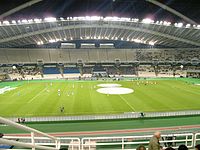 OAKA, Athens' Olympic Stadium.
OAKA, Athens' Olympic Stadium.
The Olympic Athletic Center of Athens hosted the Mediterranean Games in 1991, the World Championship in Athletics in 1997, the 2007 UEFA Champions League Final well as other important athletic and cultural events, the most significant of which remains the Summer Olympics in 2004.[39]Stadium Name Capacity Years Nikos Goumas Stadium original: 37.000
(24.729 with seats)1928–03 Athens Olympic Stadium 69.618 1985–87,
2004–presentRecords
Record home attendance – 74,473 v. Panathinaikos, 23 May 1986
Training Facility
AEK Athens training complex in Spata is the most expensive,the most new and one of the biggest training centers in Greece.There are 3 regular pitches and one in synthetic grass.The main building of the centre hosting amongst many others the team's offices,a press room and the players rooms.The training ground houses both AEK Athens first team and Reserves.AEK moved to the complex on November of 2010.
Supporters
AEK Athens has a large fanbase,the majority of AEK supporters are refugees or have refugee decent from Constantinople and people from the population exchange of the Minor Asia Catastrophe.Original 21 is the largest AEK Athens supporters club. The first attempt to organise AEK supporters was Gate 21 (formed in 1975), which took its name from the gate in the Nikos Goumas Stadium, Nea Filadelfia, where the most hardcore fans gathered.AEK Athens have also many supporters worldwide,most of them Greek immigrants,in places as North America, England, Australia and Cyprus.
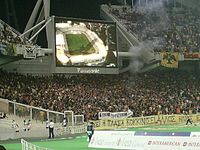 A.E.K. F.C. fans in Athens Olympic Stadium
A.E.K. F.C. fans in Athens Olympic Stadium
A.E.K. F.C.– A.S.Livorno – Olympique Marseille
There is a strong relationship between AS Livorno, AEK Athens, and Olympique Marseille. A.E.K. fans often lift banners and create choreography in support of the fellow teams. A so-called "triangle of brotherhood" has developed between the most heavily supported fan clubs of Olympique de Marseille, Livorno, and AEK Athens, namely between Commando Ultras 84, Brigate Autonome Livornesi 99, and Original 21. Their connection is mostly an ideological one.
Rivalries
Main article: AEK and Panathinaikos rivalryMain article: Olympiacos and AEK rivalryMain article: Double-headed eagles derbyAEK Athens biggest rivalries is with Panathinaikos, Olympiacos. Against neighbours Panathinaikos they contest in the Athens local football derby.The rivalry started because of the refugee decent of AEK Athens fans and by contrast Panathinaikos considered the classic representative of high class society of Athens. The rivalry with Olympiacos begun from the different regions of Attica the clubs are from,AEK Athens and Olympiacos from Piraeus.Another reason is that Olympiacos except the working class fans have many high class & rich supporters.
Honours and achievements
- Domestic[40]
 Greek League: 11
Greek League: 11
 Greek Cup: 14
Greek Cup: 14
-
- 1971 (unofficial), 1989, 1996
-
- 1990,
-
- 1940, 1946, 1947, 1950
- European Competitions
- Finalist in Balkans Cup (1) : 1967
- Semi-Finalist in UEFA Cup (1) : 1977
- Quarter-Finalist in European Champion Clubs' Cup (1) : 1969
- Quarter-Finalist in European Cup Winners Cup (2) : 1997, 1998
Players
Current squad
- As of 4 September 2011.
Note: Flags indicate national team as has been defined under FIFA eligibility rules. Players may hold more than one non-FIFA nationality.
No. Position Player 1 
MF Pantelis Kafes (Captain) 2 
DF Giannis Kondoes 3 
DF Elfar Freyr Helgason 4 
DF Kostas Manolas 5 
DF Traianos Dellas (vice-captain) 6 
DF Cala 7 
MF Roger Guerreiro 8 
FW Steve Leo Beleck 9 
MF Leonardo 10 
MF José Carlos 11 
FW Dimitris Sialmas 12 
FW Thomas Tsitas 13 
MF Antonis Rikka 14 
MF Grigoris Makos 15 
DF Nikolaos Karabelas 16 
DF Anestis Argyriou No. Position Player 17 
MF Paul Katsetis 19 
MF Panagiotis Lagos 21 
MF Fabián Vargas 22 
FW Eiður Guðjohnsen 23 
GK Dimitrios Konstantopoulos 24 
MF Nathan Burns 28 
GK Thodoris Moschonas 31 
DF Nikolaos Georgeas 33 
FW Nikos Liberopoulos (vice-captain) 47 
DF Mavroudis Bougaidis 66 
DF Nikos Egglezou 77 
MF Viktor Klonaridis 88 
MF Taxiarchis Fountas 90 
MF Savvas Gentsoglou 92 
DF Sokratis Tsoukalas 99 
GK Giannis Arabatzis On loan
Note: Flags indicate national team as has been defined under FIFA eligibility rules. Players may hold more than one non-FIFA nationality.
No. Position Player 
DF Spiros Matentzidis (Diagoras F.C.) 
DF Stamatis Kalamiotis (Thrasyvoulos F.C.) 
MF Valentinos Vlachos (Thrasyvoulos F.C.) 
MF Xenofon Fetsis (A.O. Glyfada F.C.) No. Position Player 
MF Joseph Agyriba (A.O. Glyfada F.C.) 
FW Serxhio Abdurahmani (Niki Volos F.C.) 
FW Giorgios Nikoltsis (Fokikos F.C. until 30.06.2012) 
FW Dimitris Froxylias (Fokikos F.C. until 30.06.2012) See also: List of Greek football transfers summer 2011
Foreign players
EU Nationals
EU Nationals (Dual citizenship)

 Roger Guerreiro
Roger Guerreiro
 Steve Leo Beleck
Steve Leo Beleck
'Non-EU Nationals
 Elfar Freyr Helgason
Elfar Freyr Helgason Eiður Guðjohnsen
Eiður Guðjohnsen Leonardo
Leonardo Fabian Vargas
Fabian Vargas Nathan Burns
Nathan Burns
U-20 Squad
Main article: AEK Athens F.C. ReservesNotable former players
For former AEK players with a Wikipedia article see Category:AEK Athens F.C. players
Name Nationality Position A.E.K.
playing careerA.E.K.
managerial careerA.E.K.
AppearancesA.E.K.
GoalsKostas Negrepontis 
FW 1926–32 1933–36,1937–40,1944–48,1955–56,1958–59 42 30 Kleanthis Maropoulos 
FW 1934–52 144 89 Giannis Kanakis 
FW 1949–59 176 69 Alekos Sofianidis 
DF 1950–69 274 12 Andreas Stamatiadis 
MF 1951–69 1979 465 139 Stelios Serafeidis 
GK 1953–71 300 Kostas Nestoridis 
FW 1957–65 1982–83,1984 300 272 Mimis Papaioannou 
FW 1961–80 483 234 Stelios Skevofylakas 
MF 1961–73 339 19 Kostas Papageorgiou 
FW 1963–69 96 65 Kostas Nikolaidis 
FW 1965–73 248 94 Giorgos Karafeskos 
MF 1965–74 270 28 Apostolos Toskas 
DF 1969–80 270 Lakis Nikolaou 
DF 1971–82 358 42 Petros Ravousis 
DF 1972–84 1996–97 278 Christos Ardizoglou 
MF 1974–85 261 50 Thomas Mavros 
FW 1976–87 277 174 Stelios Manolas 
DF 1977–00 448 44 Spyros Oikonomopoulos 
GK 1978–94 115 Ioannis Dintsikos 
FW 1981–89 150 26 Pavlos Papaioannou 

MF 1983–93 255 4 Giorgos Savvidis 
MF 1987–92 135 33 Toni Savevski 

MF 1989–01 2001 356 51 Daniel Batista 

FW 1989-92,1995-99 167 67 Vasilis Dimitriadis 
FW 1991–96 154 81 Elias Atmatsidis 
GK 1992–02 251 1 Vassilios Tsiartas 
MF 1993–96,2000–04 196 80 Michalis Kasapis 
DF 1993-04 254 9 Nikos Kostenoglou 
DF 1994-05 2008,10/2011-Present 222 3 Christos Kostis 
FW 1994–98,2000-05 112 56 Demis Nikolaidis 
FW 1996–03 189 125 League top scorers(Seasons)
 Kostas Nestoridis – (5)
Kostas Nestoridis – (5) Thomas Mavros – (4)
Thomas Mavros – (4) Mimis Papaioannou – (2)
Mimis Papaioannou – (2) Vasilis Dimitriadis – (2)
Vasilis Dimitriadis – (2) Ismael Blanco – (2)
Ismael Blanco – (2) Giorgos Dedes – (1)
Giorgos Dedes – (1)
 Dušan Bajević – (1)
Dušan Bajević – (1) Giorgos Dedes – (1)
Giorgos Dedes – (1) Henrik Nielsen – (1)
Henrik Nielsen – (1) Alexandros Alexandris – (1)
Alexandros Alexandris – (1) Vassilios Tsiartas – (1)
Vassilios Tsiartas – (1) Demis Nikolaidis – (1)
Demis Nikolaidis – (1) Nikos Liberopoulos – (1)
Nikos Liberopoulos – (1)
Current Board & Ownership
Board of Directors President & CEO  Stavros Adamidis
Stavros AdamidisVice President  Nicholas X. Notias
Nicholas X. Notias Theocharis Kosmatos
Theocharis KosmatosBoard Members  Konstantinos Kapetanakis
Konstantinos Kapetanakis Dimitris Kapsis
Dimitris Kapsis Thanassis Michail (representing Athletic Union of Constantinople)
Thanassis Michail (representing Athletic Union of Constantinople) Avraam Kasnakidis (representing "A.E.K. Supporters Club")
Avraam Kasnakidis (representing "A.E.K. Supporters Club")Team Ownership & Amount of Shares owned(%) Shareholders  A.E.K. Supporters Club 38%
A.E.K. Supporters Club 38% Nicholas X. Notias 34.5%
Nicholas X. Notias 34.5% Athletic Union of Constantinople 22.5%
Athletic Union of Constantinople 22.5% Other Shareholders 5%
Other Shareholders 5%Coaching staff
Technical and medical staff & Academies staff
Technical staff Head coach  Nikos Kostenoglou
Nikos KostenoglouAssistant coach  Georgios Alexopoulos
Georgios AlexopoulosPhysical fitness coach Goalkeeping coach  Konstantinos Kampolis
Konstantinos KampolisTeam Manager  Vasilis Dimitriadis
Vasilis DimitriadisTechnical Director  Arnar Grétarsson
Arnar GrétarssonScouting Director 
 Toni Savevski
Toni SavevskiMedical staff Head of Medical team  Lakis Nikolaou
Lakis NikolaouDoctor  Alkiviadis Kaliakmanis
Alkiviadis KaliakmanisPhysiotherapist  Nikos Pantazis
Nikos PantazisPhysiotherapist  Nikos Siskas
Nikos SiskasPhysiotherapist  Giorgos Zouridakis
Giorgos ZouridakisPhysiotherapist  Dionysis Egkarhos
Dionysis EgkarhosAcademies staff Academies Director  Andreas Stamatiadis
Andreas StamatiadisHead of Youth Development Program  Anastasios Stasinopoulos
Anastasios StasinopoulosDepartment Operations  Paraskevas Makridis
Paraskevas MakridisPE coach  Giorgos Vamvakas
Giorgos VamvakasPE coach to Under 20 & Under 17  Stelios Bisbas
Stelios BisbasHead of Goalkeeper coaches  Stelios Serafidis
Stelios SerafidisGoalkeeper coach  Sotiris Bouglas
Sotiris BouglasUnder 20 coach 
 Daniel Batista
Daniel BatistaUnder 17 coach  Charis Kopitsis
Charis KopitsisUnder 17 Assistant coach  Aggelos Chatzopoulos
Aggelos ChatzopoulosUnder 15 coach  Manolis Papadopoulos
Manolis PapadopoulosUnder 14 coach  Giorgos Papakostoulis
Giorgos PapakostoulisUnder 12 coach  Stavros Letsas
Stavros LetsasDoctor  Giannis Vlamis
Giannis VlamisDoctor  Andreas Anamorlidis
Andreas AnamorlidisPhysiotherapist  Nikos Kalambokas
Nikos KalambokasPhysiotherapist  Konstantinos Spaneas
Konstantinos SpaneasPhysiotherapist  Theodoros Serafeidis
Theodoros SerafeidisScouter  Vaggelis GavrilisFor more details on this topic, see List of AEK Athens F.C. managers.
Vaggelis GavrilisFor more details on this topic, see List of AEK Athens F.C. managers.- Key
- * Served as Caretaker-manager.
† Served as caretaker manager before being appointed permanently.
Only competitive matches are counted. Wins, losses and draws are results at the final whistle; the results of penalty shootouts are not counted.
Notable managers
Name Nat From To Championships Cups Kostas Negrepontis 

1933
1937
1944
1955
19581936
1940
1948
1956
19592 Greek Leagues
1 Greek CupJack Bimby 
1948 1951 2 Greek Cups Mario Magnozzi 
1951 1953 — Tryfon Tzanetis[A] 

1954
1956
1960
19651955
1957
1962
1966— Heinrich Müller 
1963 1964 1 Greek Cup Jenő Csaknády[A] 

1962
19671963
19682 Greek League Branko Stanković[A] 
1968 1973 1 Greek League Stan Anderson[A] 
1973 1974 — František Fadrhonc 

1974 1977 — Zlatko Čajkovski 

1977
19821978
19821 Greek League
1 Greek CupFerenc Puskás 

1978 1979 — Helmut Senekowitsch 
1983 1983 1 Greek Cup Giannis Pathiakakis 
09/01/2000 24/01/2001 1 Greek Cup Fernando Santos 
2001
20042002
20061 Greek Cup Llorenç Serra Ferrer 
2006 2008 — Dušan Bajević 

1988
20/05/2002
21/11/20081996
25/01/2004
27/09/20104 Greek Leagues
1 Greek Cup
1 Greek League Cup
1 Greek Super CupManolo Jiménez 
06/10/2010 06/10/2011 1 Greek Cup Chairmen
 Konstantinos Spanoudis (1924–32)
Konstantinos Spanoudis (1924–32) Alexandros Strogilos (1932–33)
Alexandros Strogilos (1932–33) Konstantinos Sarifis (1933–35)
Konstantinos Sarifis (1933–35) Konstantinos Theofanidis (1935–37)
Konstantinos Theofanidis (1935–37) Konstantinos Chrisopoulos (1937–38)
Konstantinos Chrisopoulos (1937–38) Vassilios Fridas (1938–40)
Vassilios Fridas (1938–40) Emilios Ionas (1945–49)
Emilios Ionas (1945–49) Spiridon Skouras (1949–50)
Spiridon Skouras (1949–50) Georgios Melas (1950–52)
Georgios Melas (1950–52) Eleftherios Venizelos (1952)
Eleftherios Venizelos (1952) Georgios Chrisafidis (1952–57)
Georgios Chrisafidis (1952–57) Nikolaos Goumas (1957–63)
Nikolaos Goumas (1957–63) Alexandros Makridis (1963–66)
Alexandros Makridis (1963–66) Georgios Toubalidis (1966)
Georgios Toubalidis (1966) Michail Trikoglou (1966–67)
Michail Trikoglou (1966–67) Emmanuil Calitsounakis (1967)
Emmanuil Calitsounakis (1967)
 Kosmas Kiriakidis (1967–68)
Kosmas Kiriakidis (1967–68) Ilias Georgopoulos (1968–69)
Ilias Georgopoulos (1968–69) Georgios Chrisafidis (1969–70)
Georgios Chrisafidis (1969–70) Kosmas Chatzicharalabous (1970–73)
Kosmas Chatzicharalabous (1970–73) Dimitrios Avramidis (1973)
Dimitrios Avramidis (1973) Ioannis Theodorakopoulos (1973–74)
Ioannis Theodorakopoulos (1973–74) Loukas Barlos (1974–81)
Loukas Barlos (1974–81) Andreas Zafiropoulos (1981–82)
Andreas Zafiropoulos (1981–82) Michalis Arkadis (1982–83)
Michalis Arkadis (1982–83) Eleftherios Panagidis (1983–84)
Eleftherios Panagidis (1983–84) Andreas Zafiropoulos (1984–88)
Andreas Zafiropoulos (1984–88) Efstratios Gidopoulos (1988–91)
Efstratios Gidopoulos (1988–91) Konstantinos Generakis (1991–92)
Konstantinos Generakis (1991–92) Dimitrios Melissanidis (1992–93)
Dimitrios Melissanidis (1992–93) Ioannis Karras (1993–94)
Ioannis Karras (1993–94) Dimitrios Melissanidis (1994–95)
Dimitrios Melissanidis (1994–95)
 Michalis Trochanas (1995–97)
Michalis Trochanas (1995–97) Georgios Kiriopoulos (1997)
Georgios Kiriopoulos (1997) Alexis Kougias (1997)
Alexis Kougias (1997) Lakis Nikolaou (1997–98)
Lakis Nikolaou (1997–98) Konstantinos Generakis (1998–99)
Konstantinos Generakis (1998–99) Stefanos Mamatzis (1999-00)
Stefanos Mamatzis (1999-00) Cornelius Sierhuis (2000–01)
Cornelius Sierhuis (2000–01) Filonas Antonopoulos (2001)
Filonas Antonopoulos (2001) Petros Stathis (2001)
Petros Stathis (2001) Chrysostomos Psomiadis (2001–03)
Chrysostomos Psomiadis (2001–03) Ioannis Granitsas (2003–04)
Ioannis Granitsas (2003–04) Demis Nikolaidis (2004–09/08)
Demis Nikolaidis (2004–09/08) Georgios Kintis (09/2008–01/09)
Georgios Kintis (09/2008–01/09) Nikos Thanopoulos (01/2009–03/10)
Nikos Thanopoulos (01/2009–03/10) Stavros Adamidis (03/2010–present)
Stavros Adamidis (03/2010–present)
Relationships with other clubs
AEK F.C. has links with many football clubs in Greece and in other countries where Greek immigrants live, for example AEK London Ontario in Canada, AEK Waverley Wanderers SC in Australia, AEK Archaggelou, AEK Chanion, AEK Argous, AEK Patron and AEK Tripolis in Greece. The club also has a football academy in Sydney.
Club anthem
AEK's club anthem was composed by Stelios Kazantzidis, and sung by Mimis Papaioannou. AEK Club Anthem
Greek Greek Transliteration English Translation First stanza ΑΕΚ, ΑΕΚ, ΑΕΚ
Αναστενάζουν τα γκολπόστ
Και τα δοκάρια σπάζουν
Της Ένωσης οι αετοί τα δίχτυα κοματιάζουνAEK, AEK, AEK
Anasthenazoun ta golpost
Kai ta dokaria spazoun
Tis Enosis i aeti ta dihtia komatiazounAEK, AEK, AEK
The goalposts sigh
And the crossbars are blown away
The Union's eagles tear the netsChorus Εμπρός της ΑΕΚ παλικάρια
Σουταρετε και σπάστε τα δοκάρια
Τα δίχτυα σκίστε
Τη δόξα κατακτήστε
Νικήστε, νικήστε, νικήστε
Τα δίχτυα σκίστε
Τη δόξα κατακτήστε
Νικήστε, νικήστε, νικήστεEmbros tis AEK palikaria
Soutarete kai spaste ta dokaria
Ta dihtia skiste
Ti doxa kataktiste
Nikiste, nikiste, nikiste
Ta dihtia skiste
Ti doxa kataktiste
Nikiste, nikiste, nikisteGo on AEK's lads
Shoot and break the goalposts
Tear the nets
Achieve glory
Win, Win, Win
Tear the nets
Achieve glory
Win, Win, WinSecond stanza ΑΕΚ, ΑΕΚ, ΑΕΚ
Οι κυνηγοί σου κεραυνοί
Βράχος η άμυνα σου
Και της Ρεάλ το φόβητρο έγινε το όνομα σουAEK, AEK, AEK
I kinigi sou keravni
Vrahos i amina sou
Ke tis REAL to fovitro egine t'onoma souAEK, AEK, AEK
Your attackers are like lightning bolts
Your defence a rock
And your name brings fear to RealChorus ΑΕΚ, ΑΕΚ, ΑΕΚ
AEK, AEK, AEK
AEK, AEK, AEK
Chorus References
- ^ "OAKA official website". http://www.oaka.com.gr/article_detail.asp?e_cat_serial=001003001001&e_cat_id=138&e_article_id=161. Retrieved 2011-07-14.
- ^ Super League classification tables, showing in the playoffs classification table, that the results of play-offs change the overall classification of teams Super League Greece 2010–2011 results – http://www.superleaguegreece.net/
- ^ w:Super League Greece#Superleague Greece 2011.E2.80.9312 members
- ^ Rules for the 2010–11 play-offs of Super League Greece stating that the playoff results do count to the overall league classification table: "Με την ολοκλήρωση των αγώνων, συντάσσεται νέα κατάταξη βάσει της οποίας η ομάδα με τη μεγαλύτερη συγκομιδή βαθμών καταλαμβάνει τη 2η θέση στο Πρωτάθλημα ΟΠΑΠ της “Super League Ελλάδα” και οι ομάδες που ακολουθούν καταλαμβάνουν αντίστοιχα, την 3η, 4η και 5η θέση στο Πρωτάθλημα ΟΠΑΠ της “Super League Ελλάδα”." – http://superleaguegreece.net/pedocs/Prokiriksi_Agonon_Katataksis_2010-2011.pdf
- ^ "Agreement heralds new era in football". uefa.com.
- ^ "Super League Greece teams". superleaguegreece.net. http://www.superleaguegreece.net/season2008/teams/aek.htm. Retrieved 2007-09-01.[dead link]
- ^ [The history of AEK by Panos Makridis. Athlitiki Iho] Newspaper, 1953
- ^ History of AEK: Born through the ashes
- ^ History of AEK: The first achievements
- ^ AEK switch to PUMA
- ^ Sevilla FC – AEK FC : 2–0 Match report from Scorespro.com
- ^ AEK FC – Sevilla FC : 1–4 Match report from Scorespro.com
- ^ Dellas signes new contract
- ^ Greece postpone games
- ^ "National Tragedy"
- ^ AEK 3–0
- ^ Salzburg – AEK
- ^ Past masters meet in group stage
- ^ AEK hold on to frustrate Elfsborg
- ^ Balzaretti own goal earns AEK a point
- ^ M Boleslav – AEK Athens : 0–1 Match report from ScoresPro.com
- ^ AEK FC – Villareal : 1–2 Match report from Scorespro.com
- ^ AEK call time on coach Serra Ferrer
- ^ "Legal Dispute". uefa.com. 2008-04-20. http://www.uefa.com/footballeurope/news/kind=16/newsid=685259.html. Retrieved 2008-05-15.
- ^ Giorgos Donis – Head Coach of AEK FC
- ^ Omonia keep the party going in Nicosia
- ^ Rivaldo leaves club (greek)
- ^ Nikolaidis Resigns
- ^ Kanellopoulos and Koulis take charge
- ^ Donis's brief tenure at AEK is over
- ^ AEK FC sign Dusan Bajevic
- ^ Thanopoulos is new AEK president
- ^ AEK qualify for final
- ^ Olympiakos win epic final 15–14 on pens
- ^ Jimenez to fill AEK Athens hotseat
- ^ "Colours info". aekfc.gr. http://www.aekfc.gr/index.asp?a_id=319. Retrieved 2008-03-20.
- ^ "Nikos Goumas Stadium info". stadia.gr. http://www.stadia.gr/ngoumas/ngoumas.html. Retrieved 2008-03-23.
- ^ OAKA Stadium
- ^ Athens Olympic Stadium
- ^ "Honours". AEK F.C.. http://www.aekfc.gr/index.asp?a_id=3011. Retrieved 2010-01-11.
External links
- (Greek) (English) AEK FC (Official website)
- AEK FC uefa.com
- (Greek) AEK News
- AEK History
The Club Club · ReservesArchive History · EuropeStadium Supporters Rivalries President Stavros AdamidisOther Sports Superleague Greece 2011–12 clubs AEK Athens · Aris · Asteras Tripolis · Atromitos · Doxa Drama · Ergotelis · Kerkyra · Levadiakos · OFI · Olympiacos · Panathinaikos · Panetolikos · Panionios · PAS Giannina · PAOK · Skoda XanthiCategories:- AEK Athens F.C.
- Greek football clubs
- Association football clubs established in 1924
- 1924 establishments in Greece
Wikimedia Foundation. 2010.



